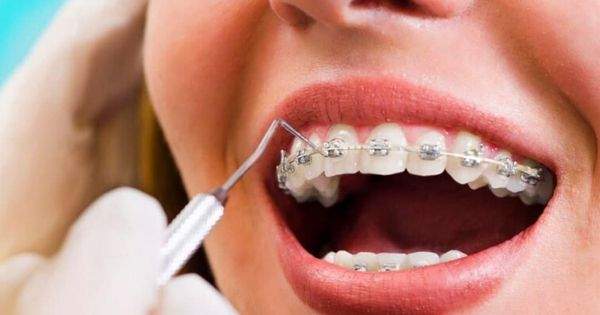Dental braces.
Dental braces are wire-based devices that Orthodontists use to find a way to correct teeth that are in a bad position or that are misaligned.
Many people who need this type of dental appliance get them during their early teens, but adults can also benefit from wearing them.
The main purpose of braces is to correctly align the upper or lower teeth and jaws to produce a uniform bite and good dental aesthetics.
For minor dental corrections, there is also the option of using custom removable appliances known as clear aligners or “ invisible braces ”.
These can have a more acceptable appearance, especially for adults.
 |
| Dental braces. |
If you are considering braces to improve your bite and smile, it is important that you get detailed information about the process and operation of the devices, as well as the possible complications that may arise.
Can braces cause teeth to fall out?
This is one of the questions that people who use braces ask themselves most frequently. The answer to this question is quite simple… No.
It is likely that after the first two or three days after the braces are placed, the teeth will begin to move and feel a little loose, however, this process is normal and is the method in which the teeth move.
Some users may feel that their teeth are going to fall out but it is completely normal, despite this, the matter may become a matter of concern for many.
Despite this, in less than 2% of patients wearing brackets, some visible root shortening may occur during routine orthodontic treatment.
The exact cause of tooth resorption is still unknown, but it is believed to be caused by a genetic predisposition, along with prolonged treatment lasting more than 3 years.
This will not usually result in any long-term problems for the teeth, as it is generally believed that a tooth can loosen up to half the length of each root and never have a problem.
The brackets than are not a cause for the teeth to loosen and fall, but it is always good that in cases where root resorption occurs, the Orthodontist monitors the progress and advises the patient of the possible consequences.
care
Some of them are:
- Reduce sugary foods and drinks to prevent plaque and tooth decay.
- Brush carefully, preferably after each meal, with fluoride toothpaste and a soft-bristled brush.
- Rinse well to get all the particles out of your brakes.
- Use a fluoride rinse if recommended by your dentist.
- Floss between braces.
- Avoid sticky foods as they can pull off brackets, bands, and wires.
- Avoid hard or crunchy foods.
- Visit your dentist for checkups and cleanings.
Dental Insurance in Orthodontics
Dental Insurance policies help many people effectively budget for the cost of maintaining a great smile.
Most policies are straightforward and specific about the procedures they cover, and this type of insurance is available as a stand-alone policy.
This type of policy provides a large number of dental benefits to those who hire it, however, most of them do not cover orthodontic procedures.
Despite this, purchasing Dental Insurance will provide you with a large number of advantages and significant financial savings when you need to use a dental device such as dental braces. The reason is simple to understand.
Before the placement of the brackets, the patient will have to go through a series of dental consultations and exams in order to determine if they need the treatment and which type of bracket is the best depending on their condition.
This is where the insurance becomes part of the treatment since the benefits they offer include preventive consultations with the dentist who is in charge of establishing the type of treatment necessary, dental cleanings necessary for the placement of appliances, simple dental extractions which are also part of the orthodontic placement process, and some of the diagnostic tests such as dental x -rays.
It is easy to understand why Dental Insurance gives the user the ability not only to save money on all these procedures but also gives him the security that he will be attended by highly qualified personnel and that his treatment will be of quality.
In addition, this type of policy, despite not covering aesthetic dental treatments, does offer the user the possibility of enjoying significant discounts on this type of procedure, which will mean saving time and money.
No comments